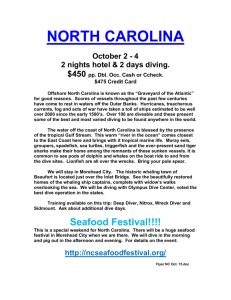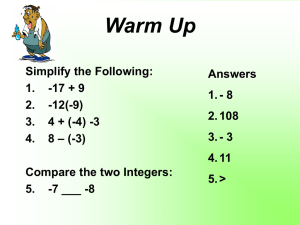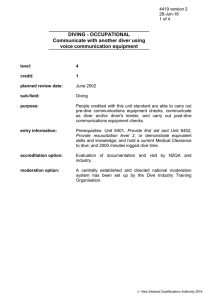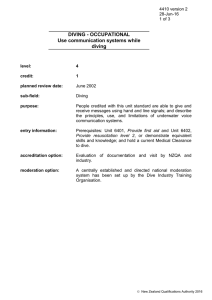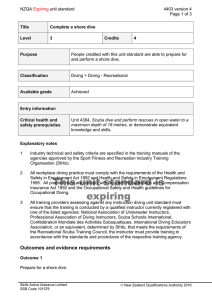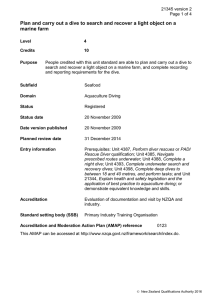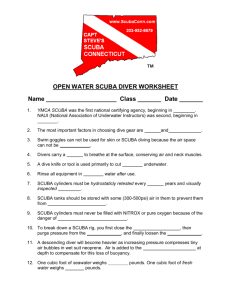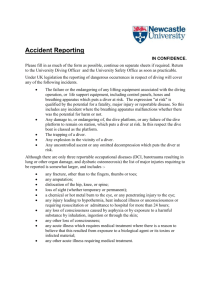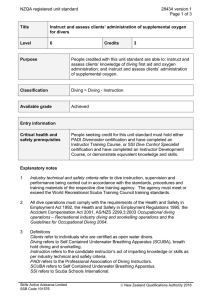NZQA registered unit standard 28395 version 1 Page 1 of 4
advertisement
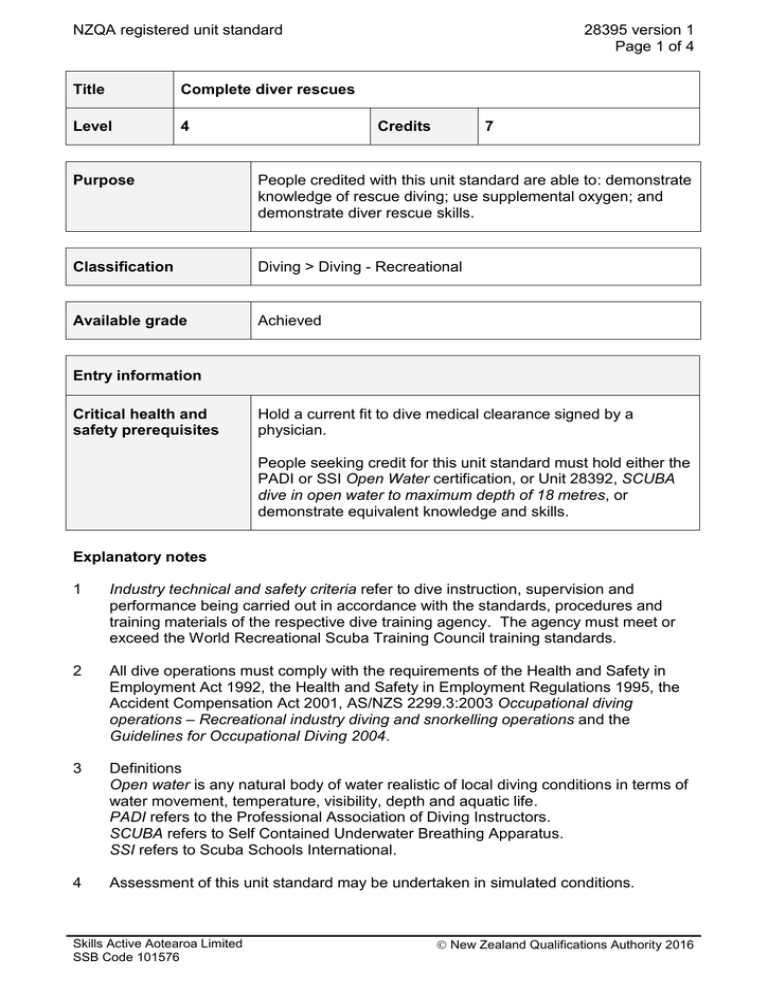
NZQA registered unit standard Title Complete diver rescues Level 4 28395 version 1 Page 1 of 4 Credits 7 Purpose People credited with this unit standard are able to: demonstrate knowledge of rescue diving; use supplemental oxygen; and demonstrate diver rescue skills. Classification Diving > Diving - Recreational Available grade Achieved Entry information Critical health and safety prerequisites Hold a current fit to dive medical clearance signed by a physician. People seeking credit for this unit standard must hold either the PADI or SSI Open Water certification, or Unit 28392, SCUBA dive in open water to maximum depth of 18 metres, or demonstrate equivalent knowledge and skills. Explanatory notes 1 Industry technical and safety criteria refer to dive instruction, supervision and performance being carried out in accordance with the standards, procedures and training materials of the respective dive training agency. The agency must meet or exceed the World Recreational Scuba Training Council training standards. 2 All dive operations must comply with the requirements of the Health and Safety in Employment Act 1992, the Health and Safety in Employment Regulations 1995, the Accident Compensation Act 2001, AS/NZS 2299.3:2003 Occupational diving operations – Recreational industry diving and snorkelling operations and the Guidelines for Occupational Diving 2004. 3 Definitions Open water is any natural body of water realistic of local diving conditions in terms of water movement, temperature, visibility, depth and aquatic life. PADI refers to the Professional Association of Diving Instructors. SCUBA refers to Self Contained Underwater Breathing Apparatus. SSI refers to Scuba Schools International. 4 Assessment of this unit standard may be undertaken in simulated conditions. Skills Active Aotearoa Limited SSB Code 101576 New Zealand Qualifications Authority 2016 NZQA registered unit standard 28395 version 1 Page 2 of 4 Outcomes and evidence requirements Outcome 1 Demonstrate knowledge of rescue diving. Evidence requirements 1.1 The physical causes of stress on a diver are described in accordance with industry technical and safety criteria. Range 1.2 The psychological causes of stress on a diver are described in accordance with industry technical and safety criteria. Range 1.3 on oneself, with regard to others, before a dive, during a dive, after a dive. Accident management in relation to diving is described in accordance with industry technical and safety criteria. Range 1.5 may include but is not limited to – physical stress, individual beliefs and attitudes, task loading, peer pressure, perception, poor judgement, buddy system failure, equipment related; a minimum of six is required. Recognising and dealing with diver stress is described in accordance with industry technical and safety criteria. Range 1.4 may include but is not limited to – fitness, fatigue, constriction of movement, cold water and hypothermia, motion sickness, nitrogen narcosis, illness, injury, alcohol and drugs, ill-fitting or malfunctioning equipment; a minimum of six is required. may include but is not limited to – emergency procedures and contacts, coordinating rescue personnel, knowing the limits of ones abilities, keeping a written record, searching for a missing diver, rescuing an accident victim, providing psychological support, transporting and evacuation; a minimum of six is required. First aid requirements in relation to diving are described in accordance with industry technical and safety criteria. Range providing first aid, CPR and oxygen administration, personal safety, disease transmission and precautions, recognising the signs, symptoms and treatment of compressed gas injuries. Outcome 2 Use supplemental oxygen. Skills Active Aotearoa Limited SSB Code 101576 New Zealand Qualifications Authority 2016 NZQA registered unit standard 28395 version 1 Page 3 of 4 Evidence requirements 2.1 Prepare oxygen equipment in accordance with industry technical and safety criteria. Range 2.2 may include but is not limited to – constant flow regulator, multifunction regulator, demand valve, unique delivery systems, fitting regulator to cylinder, flow rates, ventilation pocket mask, non re breather mask, simple face mask, nasal canula, bag valve mask, safety considerations; a minimum of four is required. Administer supplemental oxygen in accordance with industry technical and safety criteria. Range breathing patient, non-breathing patient. Outcome 3 Demonstrate diver rescue skills. Evidence requirements 3.1 First aid is administered for dive incidents in accordance with industry technical and safety criteria. Range 3.2 may include but is not limited to – respiratory and cardiac arrest, control of bleeding, shock, head, neck or back injury, heat exhaustion, heat stroke, hypothermia, near drowning, cramps, exhaustion, decompression illnesses, barotraumas, contaminated air, aquatic life injuries; a minimum of six is required. Rescues of self and buddy are demonstrated for open water dive incident situations in accordance with industry technical and safety criteria. Range may include but is not limited to – out of air emergencies, cramp removal, fatigued diver, panicked diver, unconscious diver at the surface, unconscious diver underwater, missing diver, egress, oxygen administration, transporting and evacuation; a minimum of two self-rescues and four buddy rescues are required. Replacement information This unit standard replaced unit standard 4387. Planned review date 31 December 2019 Skills Active Aotearoa Limited SSB Code 101576 New Zealand Qualifications Authority 2016 NZQA registered unit standard 28395 version 1 Page 4 of 4 Status information and last date for assessment for superseded versions Process Version Date Last Date for Assessment Registration 1 20 November 2014 N/A Consent and Moderation Requirements (CMR) reference 0099 This CMR can be accessed at http://www.nzqa.govt.nz/framework/search/index.do. Please note Providers must be granted consent to assess against standards (accredited) by NZQA, before they can report credits from assessment against unit standards or deliver courses of study leading to that assessment. Industry Training Organisations must be granted consent to assess against standards by NZQA before they can register credits from assessment against unit standards. Providers and Industry Training Organisations, which have been granted consent and which are assessing against unit standards must engage with the moderation system that applies to those standards. Requirements for consent to assess and an outline of the moderation system that applies to this standard are outlined in the Consent and Moderation Requirements (CMR). The CMR also includes useful information about special requirements for organisations wishing to develop education and training programmes, such as minimum qualifications for tutors and assessors, and special resource requirements. Comments on this unit standard Please contact Skills Active Aotearoa Limited info@skillsactive.org.nz if you wish to suggest changes to the content of this unit standard. Skills Active Aotearoa Limited SSB Code 101576 New Zealand Qualifications Authority 2016
